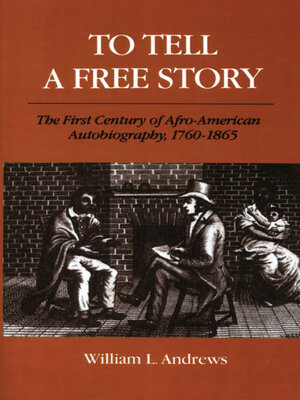To Tell a Free Story
ebook ∣ The First Century of Afro-American Autobiography, 1760-1865
By William L. Andrews

Sign up to save your library
With an OverDrive account, you can save your favorite libraries for at-a-glance information about availability. Find out more about OverDrive accounts.
Find this title in Libby, the library reading app by OverDrive.



Search for a digital library with this title
Title found at these libraries:
| Library Name | Distance |
|---|---|
| Loading... |
To Tell A Free Story traces in unprecedented detail the history of Black autobiography from the colonial era through Emancipation. Beginning with the 1760 narrative by Briton Hammond, William L. Andrews explores first-person public writings by Black Americans. Andrews includes but also goes beyond slave narratives to analyze spiritual biographies, criminal confessions, captivity stories, travel accounts, interviews, and memoirs. As he shows, Black writers continuously faced the fact that northern whites often refused to accept their stories and memories as sincere, and especially distrusted portraits of southern whites as inhuman. Black writers had to silence parts of their stories or rely on subversive methods to make facts tellable while contending with the sensibilities of the white editors, publishers, and readers they relied upon and hoped to reach.|
Cover
Title
Copyright
Contents
Preface
Chapter 1. The First Century of Afro-American Autobiography: Notes toward a Definition of a Genre
Chapter 2. Voices of the First Fifty Years, 1760-1810
Chapter 3. Experiments in Two Modes, 1810-40
Chapter 4. The Performance of Slave Narrative in the 1840s
Chapter 5. The Uses of Marginality, 1850-65
Chapter 6. Culmination of a Century: The Autobiographies of J.D. Green, Frederick Douglass, and Harriet Jacobs
Conclusion. "Free at Last": From Discourse to Dialogue in the Novelized Autobiography
Notes
Annotated Bibliography of Afro-American Autobiography, 1760-1865
Annotated Bibliography of Afro-American Biography, 1760-1865
Index
Back Cover
|"To Tell a Free Story imaginatively combines literary criticism, anthropological theory, and history to provide a detailed, nuanced, and persuasive reading of Afro-American autobiography from its origins in the eighteenth century through emancipation."—Julius S. Scott, Journal of Southern History
"This book is superb in so many ways that I really don't know where to begin my praises. It will be the book-of-the-year in Afro-American literary studies."—Robert B. Stepto, author of From Behind the Veil: A Study of Afro-American Narrative
"Andrews treats early Afro-American autobiography in greater detail, with more theoretical acumen, and with a finer literary tact, sensitivity, and intelligence than any other single critic. It is a first-rate work which, among a host of other virtues, is distinguished by it's stylistic clarity and grace."—James Olney, author of Metaphors of the Self: The Meaning of Autobiography
|William L. Andrews is E. Maynard Adams Professor of English in the Department of English and Comparative Literature at the University of North Carolina at Chapel Hill. He is the author of The Literary Career of Charles W. Chesnutt,, editor of Life of John Thompson, a Fugitive Slave, and coeditor of Slave Narratives from the Library of America.
"This book is superb in so many ways that I really don't know where to begin my praises. It will be the book-of-the-year in Afro-American literary studies."—Robert B. Stepto, author of From Behind the Veil: A Study of Afro-American Narrative
"Andrews treats early Afro-American autobiography in greater detail, with more theoretical acumen, and with a finer literary tact, sensitivity, and intelligence than any other single critic. It is a first-rate work which, among a host of other virtues, is distinguished by it's stylistic clarity and grace."—James Olney, author of Metaphors of the Self: The Meaning of Autobiography
|William L. Andrews is E. Maynard Adams Professor of English in the Department of English and Comparative Literature at the University of North Carolina at Chapel Hill. He is the author of The Literary Career of Charles W. Chesnutt,, editor of Life of John Thompson, a Fugitive Slave, and coeditor of Slave Narratives from the Library of America.







